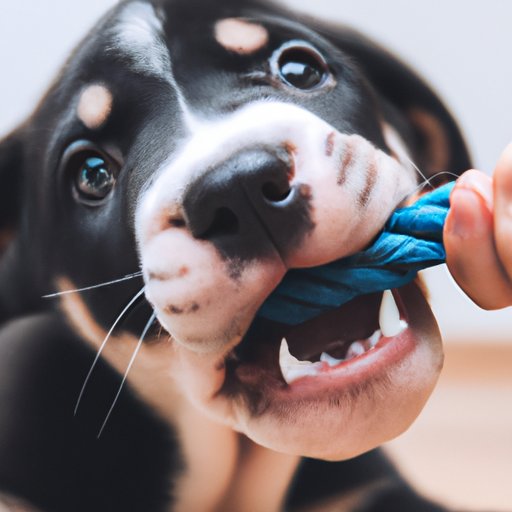Why Does My Puppy Keep Biting Me?
As a new puppy owner, it’s not uncommon to feel overwhelmed and frustrated when your furry friend constantly bites you. While a puppy’s biting may seem like a harmless behavior at first, it can quickly escalate into aggression and become a serious issue. The good news is that this behavior can be curbed with proper training and socialization. In this article, we will discuss the reasons why puppies bite and explore effective strategies for stopping this behavior.
5 Reasons Why Puppies Bite and How to Stop It
There are several reasons why puppies bite, including:
- Teething: Similar to babies, puppies go through teething as their adult teeth grow in, causing them to feel discomfort and pain in their mouths. Puppies may chew or bite as a way to relieve their discomfort.
- Boredom: Puppies have a lot of energy, and without sufficient stimulation or toys to play with, they may turn to biting as a form of entertainment.
- Fear: Puppies may bite out of fear if they feel threatened or in danger.
- Attention-seeking: Puppies may bite or nip if they want to get attention from their owners.
- Exploration: Puppies use their mouths to explore the world around them and may bite or chew on things as a result.
To stop biting behavior, redirection is key. Provide your puppy with toys that are safe to chew and redirect their biting toward these toys. Reward your puppy with praise and treats when they chew on these toys instead of biting you. Use verbal cues, such as “no biting,” to help your puppy understand that biting is not acceptable behavior.
Is Your Puppy Teething or Just Misbehaving? Understanding the Causes of Biting
Teething is a common cause of biting behavior in puppies. As mentioned earlier, puppies may bite as a way to relieve the pain and discomfort associated with teething. However, it’s important to differentiate between teething-related biting and other behavioral issues. If your puppy is a chronic biter, it could be a sign of an underlying behavioral problem that requires attention.
To tell whether the issue is teething-related or behavioral, observe your puppy’s behavior. If your puppy is biting excessively and seems to be in pain or discomfort, it’s likely teething-related. However, if your puppy is biting out of spite or aggression, it’s likely a behavioral issue that requires attention.
The Dangers of Allowing Your Puppy to Continue Biting
It’s essential to discourage biting behavior early on to avoid future issues. Allowing your puppy to continue biting can lead to more significant problems, such as aggression or injury. Puppies grow up to become larger dogs and may cause harm if their biting behavior is not addressed early on. Furthermore, biting behavior can lead to legal issues if someone is injured as a result.
Positive Reinforcement Training Techniques to End Puppy Biting
Positive reinforcement training is an effective technique for discouraging biting behavior. When your puppy exhibits good behavior, reward them with praise and treats. This method reinforces that good behavior is rewarded, and biting is not. Clicker training is another popular training technique used to teach puppies that biting is not acceptable. Clicker training uses a clicking sound to signal to the dog that they have exhibited good behavior.
It’s important to be consistent when training your puppy. Consistency and repetition are key to reinforcing good behavior.
How to Socialize Your Puppy to Prevent Biting
Socialization is critical to preventing biting behavior. Proper socialization involves exposing your puppy to different people, animals, and environments to help them become comfortable with the world around them. Socialization activities can include going on walks, visiting dog parks, and taking your puppy to puppy obedience classes.
Introduce your puppy to different people, including children, to help them become comfortable around all types of individuals. Expose your puppy to different environments to help prevent fear-related biting behavior.
When to Seek Professional Help for Your Puppy’s Biting Behavior
If your puppy’s biting behavior doesn’t improve with training and socialization, it may be time to seek professional help. A professional dog trainer or behaviorist can help identify the cause of your puppy’s biting behavior and create a personalized training plan to address the issue. Seek out qualified and experienced professionals to ensure that your puppy receives the best possible care and attention.
Conclusion
In conclusion, puppy biting is a common issue that can be addressed with proper training and socialization. Understanding the cause of your puppy’s biting behavior is essential to developing an effective training plan.
Through redirection, positive reinforcement, and socialization activities, puppies can learn that biting is not acceptable behavior. Seek professional help if necessary, and remember to be patient and consistent in your training efforts. With time and effort, your puppy will learn that biting is not an acceptable way to interact with others.
